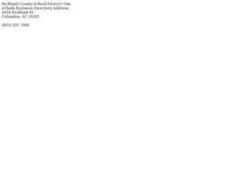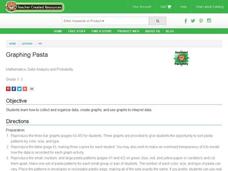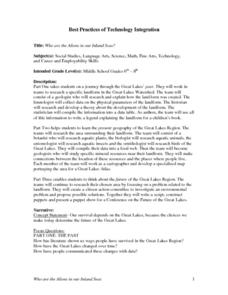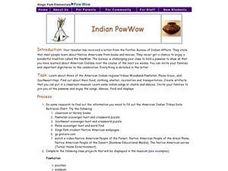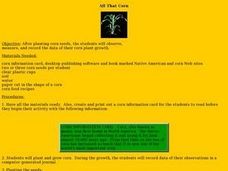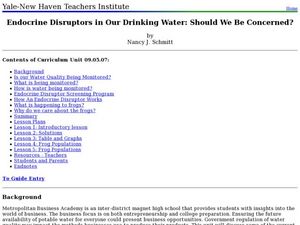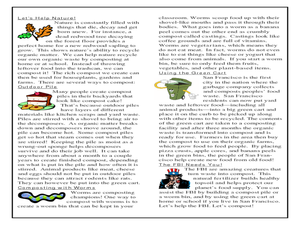Curated OER
Revised “Understanding Nutrition” Activity
Students evaluate their current food choices. In this health science lesson, students test different drinks to rate the amount of Vitamin C content. They discuss results in class.
Curated OER
Nutrition Track
Young scholars examine the importance of a healthy diet based on the USDA food pyramid. They log their daily food intake in a journal. They create charts to analyze and compare their diets to the USDA recommended allowances.
Curated OER
Who Eats Whom in the Salt Marsh?
Seventh graders complete a virtual online salt marsh tour. In groups, they observe and identify the various types of animals found in the marsh. After categorizing the animals, they create a food web based on the animals role in the...
Curated OER
Fiber - Adding it to the Diet - Skill Supplement
Food preparation that supports the concepts of adding fiber and water to the diet. Identify fiber, its sources and functions. National Standard 14.2.1 Identify the function of fiber Identify cellulose - non digestible fiber Discuss the...
Curated OER
Hispanic Heritage - Culmination and Fiesta
Third graders learn the meaning of a Fiesta and the tradition of the Pinata. They eat authentic Mexican food. They participate in games and fun activities celebrating Hispanic Heritage Month. They share one thing they learned about the...
Curated OER
Mix It Up : Colors
Fifth graders make predictions of the resulting colors when colors are mixed. In this colors lesson, 5th graders discuss vocabulary related to mixing colors. Students are asked to paint a picture of five colors from two...
Curated OER
Biomagnification
Students use real data to create an algebraic equation. They explain how the build up of small levels of contaminates can quickly become detrimental to species higher in the food chain.
Curated OER
The Motion of Molecules in Water
Students observe the motion of water molecules using food coloring. In this molecule movement lesson plan, students observe motion in hot, cold and room temperature colored water and record observation data on record sheets. Then write a...
Curated OER
Cultures and Cuisines WebQuest
High schoolers create and present a powerpoint presentation. In this cultures and cuisines research lesson, students select a country, interview someone from that country and visit a restaurant from that country. High...
Curated OER
Graphing Pasta
Young scholars sort and graph various types of pasta. Using pasta construction paper patterns or real pasta, they sort the pasta by color, size, and type, and record the data on a graph.
Curated OER
Who Are the Aliens in Our Inland Seas?
Middle schoolers work in teams to research specific landforms in Great Lakes Watershed, compile information into data table, and write legend explaining landform for children's book. Students then research area surrounding landform,...
Curated OER
Graphing Dairy Production Statistics
Students discover the total impact of milk on our society by graphing data. In this statistics lesson plan, students discover the dirty and sometimes unhealthy road milk travels to get into our bodies. Students analyze dairy...
Curated OER
Indian PowWow
Students identify three different American Indian regions and tribes, their food, clothing, shelter, recreation, and transportation. Students create artifacts that can be placed in a museum. Students sing songs, chants, and dance. ...
Curated OER
Dino-Mite Web Quest
In this science learning exercise, students identify a specific dinosaur to research. Then they develop an overview of their dinosaur family and the foods each dinosaur in their family eat. Students also identify how the dinosaurs defend...
Curated OER
Mixing Colors
Students understand why we see various colors. In this mixing colors lesson, students experiment with different food coloring to explore how colors are made. Students record on a data sheet the colors they see.
Alabama Learning Exchange
Plants, Soil and Nutrients
Young scholars conduct an experiment. They review how to use the scientific method to conduct an experiment with white carnations and food coloring. They create a hypothesis and test it to better understand how plants get nutrients,...
Curated OER
All That Corn
Young scholars observe and record data. In this plant growth instructional activity, students plant and grow corn. Young scholars observe the growth of their corn and record their data. Students read corn recipes and...
Curated OER
Endocrine Disruptors in Our Drinking Water: Should We Be Concerned?
High schoolers investigate the different hormone contaminants in the water supply. In this math lesson, students analyze data tables and graphs. They demonstrate exponential growth and decay using frog populations.
Curated OER
Hawaiian Bird Beak Adaptation
Young scholars explore adaptation by participating in a lab activity. In this bird characteristics lesson, students discuss the different purposes birds have for their beaks and conduct an experiment testing which beaks collect food...
Curated OER
Global Warming Statistics
Students research real-time and historic temperature data of U.S. and world locations, and analyze the data using mean, median, and mode averages. They graph the data and draw conclusions by analyzing the data. A spreadsheet is used to...
Curated OER
A Walk Through the Gut
Students explain what happens to food as it passes through the digestive system. They have a 3x5 index card representing food, which he / she carries to stations around the room. Each station represents one of the organs of the digestive...
Curated OER
Trophic Ecology of Humans
students analyze the place of humans among the tropic levels by observing what we eat. They calculate the caloric content of several foods commonly eaten by humans and calculate the total energy cost to grow, process, transport, store...
Curated OER
Trophic Ecology of Humans
Students analyze the trophic level of humans by first calculating the kilocalories in own their lunch. They then calulate the kilocalories in a wide variety of foods found in grocery stores and compare the kilocalories needed to acquire...
Curated OER
Let's Build a Worm Bin
Young scholars explore the process of decomposition. In this ecology and measurement instructional activity, students prepare a worm home to be used for vermicomposting. Young scholars weigh a group of worms and the added food, recording...





